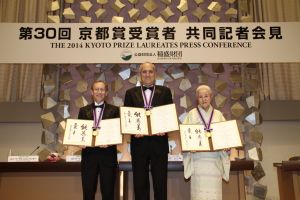INAMORI FOUNDATION AWARDS 30TH KYOTO PRIZE
Outstanding achievements in science and culture honored
10 November 2014
Kyoto/Neuss – Biomedical engineer Dr. Robert Samuel Langer, theoretical physicist Dr. Edward Witten and dyeing and weaving artist Fukumi Shimura received the Kyoto Prize on Monday November 10. Along with the Nobel Prize, the award is one of the world’s highest honors in the fields of culture and science. Every year, the Inamori Foundation — established by Kyocera founder Dr. Kazuo Inamori — recognizes laureates in three categories for their lifetime achievements. The prize is worth 50 million yen (currently around €362,000*) per category.
At a festive ceremony held at the Kyoto International Conference Center in the former imperial capital of Japan, each laureate in the categories of Advanced Technology, Basic Sciences, and Arts and Philosophy received a diploma, the Kyoto Prize medal and prize money. The presentation ceremony took place in the presence of Princess Takamado, a member of the Japanese imperial family and over a thousand guests from business, political and cultural circles from around the world.
2014 laureates
Dr. Robert Samuel Langer (b. 29 August 1948, USA)
Dr. Langer founded the tissue engineering which is indispensable for the implementation of regenerative medicine, by applying biodegradable polymer technologies to construct “scaffolds” for cells, thereby succeeding in the regeneration of various organs. He has also developed drug delivery system technologies for the controlled release of proteins, nucleic acids, and other macromolecular drugs, and has actively promoted their practical applications. Dr. Langer is a pioneer to take the lead in the interdisciplinary field of medicine and engineering.
Dr. Edward Witten (b. 26 August 1951, USA)
Dr. Witten has made significant contributions to theoretical physics for more than 30 years as a leader in the dramatic evolution of superstring theory. Moreover, by applying his physical intuition and mathematical skills, he has advanced mathematics, and prompted the cutting-edge research of many mathematicians. His achievements are both unique and outstanding.
Fukumi Shimura (b. 30 September 1924, JAP)
Ms. Shimura has developed her original style of art, commanding an extraordinarily colorful range of plant-dyed yarns as her visual vocabulary and unleashing her imagination to improvise an infinite resonance of colors over canvases of tsumugi kimono. Through a constant communication with nature and deep meditation, she has cultivated a “tender and flexible thought that advances to weave human existence into nature.”
The Kyoto Prize: An award with a rich tradition
With its Kyoto Prize, the Inamori Foundation honors the lifetime achievements of individuals who have made an outstanding contribution to the development of the sciences and arts. The prize was initiated in 1984 by Kazuo Inamori, founder of Japanese technology company Kyocera, which is headquartered in Kyoto. The Kyoto Prize is awarded annually in November by the Inamori Foundation, also established by Kazuo Inamori, in the categories Advanced Technology, Basic Sciences, and Arts and Philosophy.
Laureates over the past 29 years include late choreographer Pina Bausch, philosopher Jürgen Habermas, Japanese fashion designer Issey Miyake, French composer Pierre Boulez and behavioral scientist Jane Goodall.
For more information on the Kyoto Prize and the Inamori Foundation, please visit www.kyotoprize.org/en/
*Exchange rate from June 18, 2014
For more information about Kyocera: www.kyocera.eu
Editorial Material
- Press information (pdf) (147.16 KB)
- Press photo (jpg) (1.43 MB)


